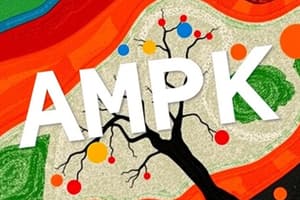Podcast
Questions and Answers
What is the primary control center for appetite regulation in the body?
What is the primary control center for appetite regulation in the body?
- The pancreas
- The liver
- The hypothalamus (correct)
- The brainstem
Which hormone is primarily released by the stomach to stimulate appetite?
Which hormone is primarily released by the stomach to stimulate appetite?
- Ghrelin (correct)
- Serotonin
- Leptin
- Insulin
What role does the AMPK play in feeding behavior during fasting?
What role does the AMPK play in feeding behavior during fasting?
- It inhibits NPY/AgRP neurons directly.
- It suppresses hunger signals from the hypothalamus.
- It is activated by ghrelin in presynaptic neurons. (correct)
- It activates leptin receptors in POMC neurons.
How do NPY/AgRP neurons influence POMC neurons?
How do NPY/AgRP neurons influence POMC neurons?
Which statement correctly describes the relationship between ghrelin and leptin?
Which statement correctly describes the relationship between ghrelin and leptin?
What role do intermediates of amino acid metabolism play in the liver?
What role do intermediates of amino acid metabolism play in the liver?
What is the primary function of lipoprotein lipase mentioned in the process?
What is the primary function of lipoprotein lipase mentioned in the process?
Where do fatty acids enter cells for utilization after digestion?
Where do fatty acids enter cells for utilization after digestion?
Which structure plays a vital role in the emulsification of dietary fats?
Which structure plays a vital role in the emulsification of dietary fats?
What does the activation of lipoprotein lipase by ApoC-II indicate?
What does the activation of lipoprotein lipase by ApoC-II indicate?
What is the primary substrate to be oxidized for energy in the body?
What is the primary substrate to be oxidized for energy in the body?
What is formed as a byproduct during the synthesis of proteins from amino acids?
What is formed as a byproduct during the synthesis of proteins from amino acids?
Which process primarily utilizes fatty acids that enter the cells?
Which process primarily utilizes fatty acids that enter the cells?
Which of the following is true about the portal vein in relation to amino acids?
Which of the following is true about the portal vein in relation to amino acids?
What is the role of AMPK in energy homeostasis?
What is the role of AMPK in energy homeostasis?
Which enzyme is primarily activated by nutrient sufficiency?
Which enzyme is primarily activated by nutrient sufficiency?
What process is regulated by the ULK1 complex during nutrient starvation?
What process is regulated by the ULK1 complex during nutrient starvation?
The activation of which complex results in autophagy?
The activation of which complex results in autophagy?
What effect do drugs that inhibit mTOR have on autophagy?
What effect do drugs that inhibit mTOR have on autophagy?
Flashcards are hidden until you start studying
Study Notes
Energy and Nutrient Sensors: AMPK
- AMPK plays a crucial role in controlling feeding behavior through the hypothalamus, involving NPY/AgRP neurons and POMC neurons.
- NPY/AgRP neurons stimulate appetite, while POMC neurons suppress it, influenced by hormones such as ghrelin (hunger signal) and leptin (satiety signal).
- Ghrelin released from the stomach activates receptors on NPY/AgRP neurons, promoting feeding, whereas leptin from adipose tissue inhibits feeding by activating receptors on POMC neurons.
AMPK Activation Mechanism
- In fasting states, ghrelin activates AMPK in presynaptic neurons, promoting neurotransmitter release onto NPY/AgRP neurons.
- The kinase triad (AMPK, mTOR, ULK1) regulates energy balance: AMPK is activated under low energy, mTOR under nutrient sufficiency, and ULK1 promotes autophagy during nutrient insufficiency.
Nutrient Sensing and Homeostasis
- AMPK activation leads to increased catabolism and decreased anabolism, boosting energy production in energy-deprived states.
- mTOR activation occurs in nutrient-rich environments, facilitating cell growth.
- ULK1 regulates autophagy during starvation by breaking down macromolecules for energy.
Autophagy Regulation and Pharmacology
- Autophagy is initiated by the ULK1 complex along with factors like PI3K class III and Beclin 1.
- Inhibiting mTOR or activating AMPK can trigger autophagy, aiding in cellular energy management.
Starve-Feed Cycle Stages
- The starve-feed cycle consists of four stages: well-fed, early fasting, fasting, and early refeeding.
- In the well-fed state, glucose, amino acids, and fats from food are efficiently metabolized, with glucose and amino acids entering the liver via the portal vein.
- Early fasting relies on glycogen stores for glucose, transitioning to gluconeogenesis (amino acids to glucose) in prolonged fasting.
Metabolic Relationships and Malnutrition
- Excess caloric intake leads to obesity, considered the most common form of malnutrition in affluent societies, often associated with metabolic syndrome.
- Protein malnutrition and starvation are prevalent in developing countries, contributing to various health complications.
- Understanding the interplay between metabolism and malnutrition is crucial for addressing public health issues.
Implications of AMPK and mTOR
- AMPK's role in feeding regulation and energy production highlights its importance in metabolic health.
- mTOR's connection to obesity and cancer suggests that therapies targeting mTOR could be valuable in treatment strategies.
- Mitophagy and its significance in quality control underscore the importance of cellular health in metabolic processes.
Studying That Suits You
Use AI to generate personalized quizzes and flashcards to suit your learning preferences.



